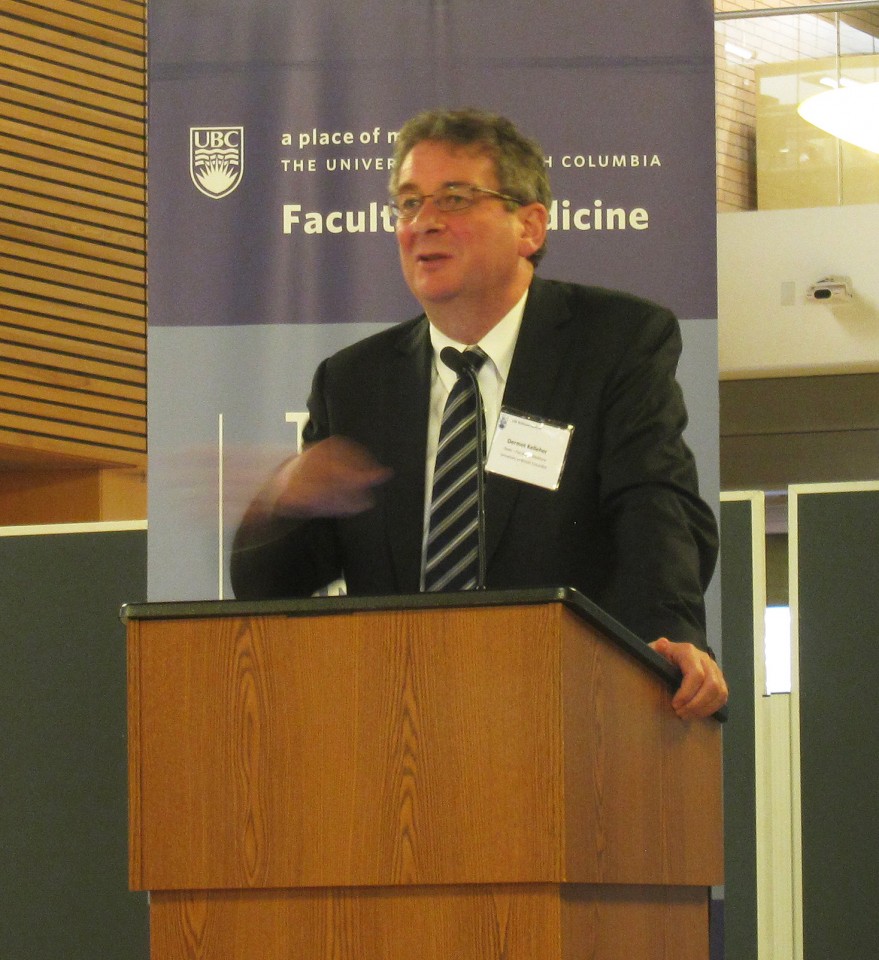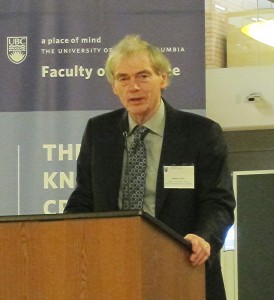
Dermot Kelleher, Dean of the Faculty of Medicine, speaks at the Life Sciences Institute’s 10th anniversary event.
With over 2,000 scholarly publications, 30,000 citations, more than 20 spin-off companies, 250 patents, three approved drugs and another 10 in clinical trials, UBC’s Life Sciences Institute is celebrating a precocious first decade of existence.
As scientists from the Faculty of Medicine and the Faculty of Science marked the institute’s 10th anniversary Oct. 28th, talk of an even more productive second decade filled the atrium of the Life Sciences Centre.
“Let’s make sure we take advantage of the beauty of this building, where people can meet in places like this, in the corridors and the alcoves,” Dermot Kelleher, the Dean of the Faculty of Medicine, told the gathering of faculty, staff, graduate students, postdoctoral students and alumni. “Let’s take advantage of what Shakespeare, who coined this term, called ‘this hurly burly innovation’ – things bouncing off each other and creating new ideas. This is what brings results. By seeking out and capitalizing on the connections among us, regardless of Faculty affiliation or department or specialty, the LSI is going to have a profound effect on society’s health – this means us, this means our families, this means our friends, the people that we know.”
The LSI’s scientists are grouped into nine clusters, including blood and blood-related processes, molecular epigenetics, and bacterial adaption and response, their labs occupying the upper floors of the Life Sciences Centre.
The building’s first years weren’t always smooth, beset by malfunctioning washrooms, power outages and hyperactive HVAC systems, said Simon Peacock, Dean of the Faculty of Science. But under the leadership of Alison Buchan, Hugh Brock, Julian Davies, Christian Naus and Linda Matsuuchi, the institute found its footing – not only with a steady stream of discoveries, but also with the creation of the Café Scientifiques (public-oriented discussions of life science research) and the formation of an LSI graduate student association.
“In 10 short years, we have forgotten those teething pains, and we are now a powerhouse in the life sciences, thanks to this institute,” Dr. Peacock said.
Now, under the leadership of Pieter Cullis, the LSI has taken up the banner of personalized medicine — using information about each person’s particular combination of genes, proteins, microbes and metabolites for better diagnosis and more precise, individually-tailored treatments. The institute hosted a summit in June and is fostering several projects, such as TreatGx, aimed at bringing those capabilities to patient care.
“We now have the capability to characterize each of us individually, and that’s an enormous thing, and the opportunities that come from that, it’s a revolution of a fundamental kind,” said Dr. Cullis, a Professor in the Department Biochemistry and Molecular Biology.
Its research output has made the LSI a magnet for graduate students and postdoctoral fellows in the life sciences — at any one time, about 400, spread across 12 different graduate programs and the nine research clusters.
One of its most recent graduates, Grace Tharmarajah, remembers coming to the Life Sciences Centre to start her doctoral studies in 2009, and sending photos of its soaring atrium to her parents. But she was even more impressed once she settled in and discovered the institute’s collegial culture.
“It’s the kind of place where people tell you where to go next, without you having to find it,” she says. “Everyone is willing to share their machines, chemicals and expertise.”
After graduating in May, Dr. Tharmarajah was able to follow through on her long-term plan of entering the biotechnology field, landing a job as a business development associate at Precision Nanosystems, which provides tools for the easy manufacturing of new nanoparticles by researchers and drug companies around the world. Although it was her first foray into the private sector and away from the bench, it wasn’t that much of a leap — not only is the company located across the street, but one if its directors and co-founders is none other than Dr. Cullis.
